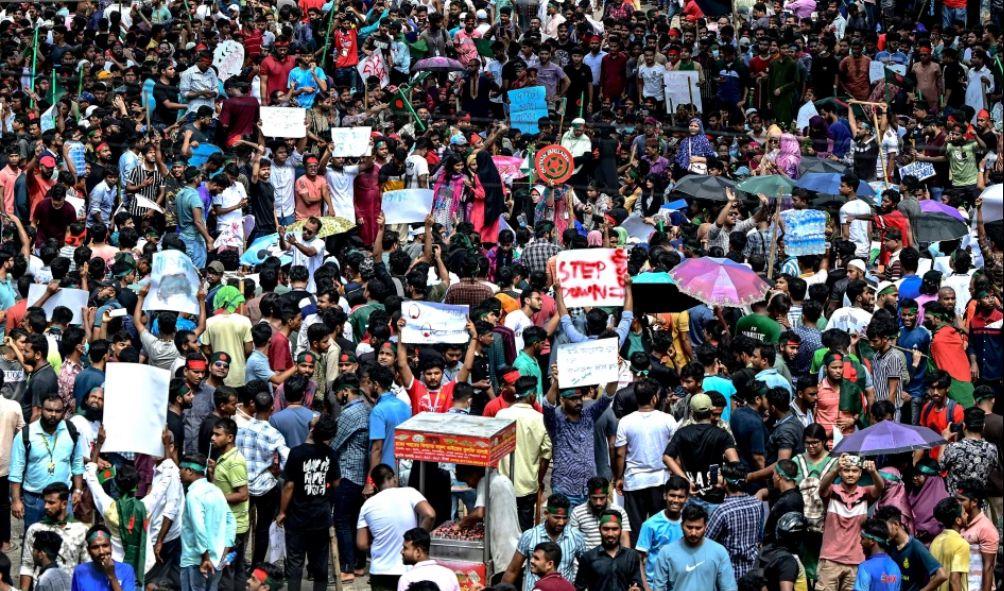Deadly Clash in Bangladesh: At Least 37 Killed in Sunday Protest Violence, Protestors Demand PM Resignation
Thousands of protesters in Bangladesh, demanding the resignation of Prime Minister Sheikh Hasina, clashed with government supporters on Sunday, resulting in dozens of fatalities and marking one of the deadliest days since the protests began.
What started as protests against civil service job quotas last month has escalated into some of the most severe unrest during Hasina’s 15-year tenure, evolving into widespread calls for her resignation.
On Sunday alone, at least 37 people lost their lives as opposing groups fought with sticks and knives, and security forces fired rifles, bringing the total number of deaths since the protests started in July to at least 243.
In contrast to previous weeks of violent crackdowns, soldiers and police largely refrained from intervening to curb the protests this time.
A prominent former army chief publicly urged the government to withdraw troops and permit the protests, delivering a significant symbolic critique of Hasina.
In Dhaka, demonstrators were seen waving a Bangladeshi flag atop an armored vehicle, surrounded by a cheering crowd, while soldiers looked on, as shown in verified social media videos.
Elsewhere, AFP reporters heard ongoing gunfire from security forces, and mobile internet access was heavily restricted, with police imposing a nationwide curfew starting at 6:00 pm (1200 GMT).
The protesters remained resolute in their determination to continue.
‘Battleground’
Troops had briefly restored order after violence broke out in July.
However, large crowds returned to the streets this month in a movement aimed at disrupting government functions.
Massive groups of protesters, many armed with sticks, gathered in Dhaka’s Shahbagh Square on Sunday, with street battles occurring in various locations and other major cities, according to police reports.
Police inspector Al Helal reported clashes between students and ruling party supporters, noting that two young men were killed in Dhaka’s Munshiganj district—one hacked to death and the other shot.
Another police source described Dhaka as having turned into a “battleground.”
In the northern city of Kishoreganj, two people were killed when protesters set fire to a ruling party office, and additional deaths were reported in northern, western, southern, and central districts. Six people were killed in Raiganj, according to government administrator Nahid Hasan Khan.
Asif Mahmud, a leader in the civil disobedience campaign, called for renewed rallies following the suppression of last month’s protests.
“Prepare bamboo sticks and liberate Bangladesh,” he urged on Facebook.
Some former military officers have joined the student-led movement, and ex-army chief General Ikbal Karim Bhuiyan changed his Facebook profile picture to red in solidarity.
“We urge the current government to immediately withdraw the armed forces from the streets,” Bhuiyan said in a statement with other senior ex-officers, condemning “brutal killings, torture, disappearances, and mass arrests.”
“Those responsible for driving the country into such dire straits must face justice,” he added.
‘No longer about job quotas’
Army chief Waker-uz-Zaman assured officers at a military headquarters meeting in Dhaka on Saturday that the “Bangladesh Army is a symbol of the people’s trust.”
“It has always supported the people and will continue to do so for the welfare of the state,” he said in an army statement, which did not clarify the army’s stance on the protests.
The demonstrations have evolved into a broad anti-government movement throughout Bangladesh, a country of approximately 170 million people.
The movement has garnered support from various sectors of society, including celebrities and musicians, with rap songs calling for public support circulating widely on social media.
“It’s not just about job quotas anymore,” said Sakhawat, a young female protester in Dhaka, as she painted graffiti calling Hasina a “killer.”
“What we want is for our future generations to live freely in this country.”
A coalition of 47 garment sector manufacturers expressed their “solidarity” with the protesters on Sunday.
Obaidul Quader, general secretary of Hasina’s ruling Awami League, has called on party members to gather “in every district” across the country to show support for the government.
Hasina has led Bangladesh since 2009 and secured her fourth consecutive term in January following an election widely criticized for lacking genuine opposition.
Her administration is accused by human rights organizations of misusing state institutions to consolidate power and suppress dissent, including through extrajudicial killings of opposition activists.
The protests, which began in early July over the reintroduction of a job quota system reserving more than half of all government jobs for specific groups, have since seen the quota scheme scaled back by the country’s top court.
Deadly Clash in Bangladesh: At Least 37 Killed in Sunday Protest Violence, Protestors Demand PM Resignation
